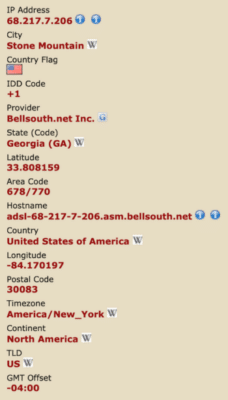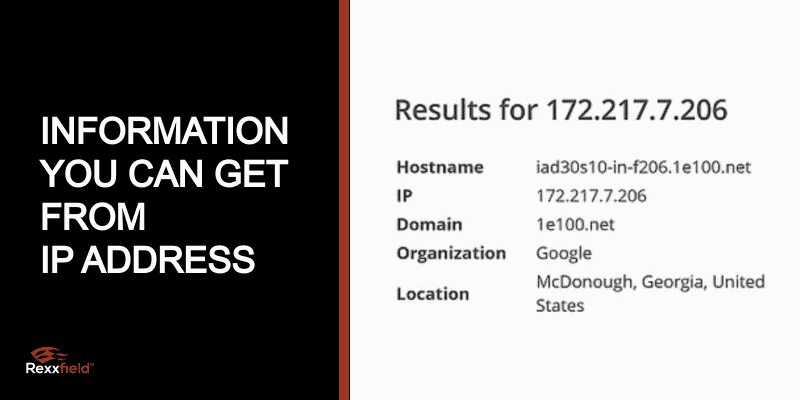Everyone who connects to the Internet through an Internet Service Provider (ISP) is assigned an IP address, which is a unique online identifier. Every device has an IP address so it can connect through this naming system and share data. Your IP address is like your mailing address, but then for your device to use the internet. The IP address routes internet traffic to your computer.
You can see what your IP is here.
When you go online and post a comment on a forum or write an article, an IP address connects the computer you use to a physical address. That IP address is stored by the ISP and by the website that hosts the content. But what does an IP address tell you?
Since 2008, we have helped over 300 people unmask their online attackers.
What do IP addresses tell you

Data from InfoSniper.net
Alone, an IP address doesn’t tell you much more than a generalized location of where you might be at a particular time. The IP address itself gives you basic details like the:
- Internet Service Providers’ (ISP) and the organization’s name
- IP’s hostname
- Country
- Region/State
- City
- Estimated latitude and longitude of the location
- Area code for that region
- Known services running on that IP
Does an IP address show location?
As you can see in the list above, an IP address tells you basic location information like the city, but it does not tell you the street name or house number, and therefore does not expose your identity.
So the IP address does not reveal your exact location.
However, through the IP address, someone can find out who your ISP is. For example, you send an email from your home, and someone traces the IP address from your email. This exposes the city you are in or a nearby city, but your physical address will not be known. Your IP address also reveals your ISP, but that is as far as they will get.
But while most cannot find you, your ISP knows where you are. ISPs go to great lengths to protect you and your privacy, but they do keep a log of your connections.
You cannot get found through your IP address unless law enforcement or online investigators are trying to locate you. They will know the ISP that belongs to your IP address. Law enforcement or online investigators can get your exact location through your ISP.
What does an IP address tell you with the help of experts
If someone does something illegal online, like child pornography, (s) extortion, or harassment, law enforcement or another government agency can subpoena your Internet Service Provider for information. With a subpoena, law enforcement can ask the ISP to provide the account holder’s name and address.
We regularly subpoena ISPs on behalf of our clients or provide law enforcement with the data needed to get a subpoena.
Our founder, Michael Roberts, who the media referred to as the “Internet Bounty Hunter,” points out that the ISP’s information is critical. While an IP address stored by websites leads a forensic expert to the ISP, the ISP’s IP address data can actually lead the expert to the account holder’s front door.
However, internet companies don’t just hand over this information. You need to get a subpoena or court order to force the ISP to release the information that belongs to the IP address.
Identify IP address data without a subpoena
But even if you are unable to get a subpoena, there are ways to link a specific person to the computer. This requires a certain set of know-how. And when you have the IP address, extracting real actionable information takes some finesse. To identify the individuals behind online attacks, we use a combination of high-tech expertise and old-fashioned instinct.
Learn more about how we identify an IP address


